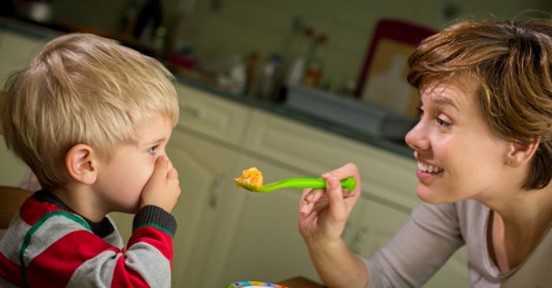- Calls to this hotline are currently being directed to Within Health, Fay or Eating Disorder Solutions
- Representatives are standing by 24/7 to help answer your questions
- All calls are confidential and HIPAA compliant
- There is no obligation or cost to call
- Eating Disorder Hope does not receive any commissions or fees dependent upon which provider you select
- Additional treatment providers are located on our directory or samhsa.gov
How To Nurture Healthy Eating Habits In Your Children

Contributed Article by by Gregory L. Jantz, PhD.
 I have regularly seen people who took food out of the box of nutrition and sprinkled it on all sort of other things -loneliness, boredom, security, anxiety, and fear. I’ve seen people with as intricate and involved a relationship with food as the most ardent of lovers. What all of these people have in common is a specific perception of food and eating -one that is not based in reality. For them, food is not consumed to fill a nutritional need; rather, it is used to fill an emotional desire.
I have regularly seen people who took food out of the box of nutrition and sprinkled it on all sort of other things -loneliness, boredom, security, anxiety, and fear. I’ve seen people with as intricate and involved a relationship with food as the most ardent of lovers. What all of these people have in common is a specific perception of food and eating -one that is not based in reality. For them, food is not consumed to fill a nutritional need; rather, it is used to fill an emotional desire.
What causes this inappropriate friendship with food?
Of course, the media share some responsibility for the way food and beauty are dealt with in commercials and regular programming, such as dieting But we also see that disordered eating tends to run in families. So, what can parents do to help their children avoid the trap of using food as a friend?
Here are five things a child needs to grow up with a healthy attitude toward herself or food:
1) Honesty. When you make promises, keep them. Be a person of your word so that your child is not constantly dealing with disappointments.
2) Affection. Every child needs affection, including hugs, verbal statements of love, and unrushed attention. Children who know they are valued are less likely to turn to food for comfort.
3) Safety. Teach your child to seek out people who are safe-emotionally, physically, and sexually. Shout this message loud and clear to your children. Protect your child from emotional and physical harm and help him learn to protect himself as he grows older.
4) Boundaries. Let your child know how important boundaries are for you. It’s okay to draw a line in the emotional sand. As your child grows, she will also learn where the boundaries are and how to keep them. This will give her resilience and make her unlikely to be a victim.
5) Structure. Children need structure. One child, playing on the school playground, was heard complaining to his teacher, “Do we really have to do what we want to today?” I continue to hear adults cry out for the same kind of direction. We all need structure, appropriate traditions, and a sense that some things are going to be the same day after day.

What you learned as a child may not have prepared you to live a happy, effective life.
You can change that for your own children, however, if you help them learn how to make their own happiness.
The following is a list of platitudes that many children hear and end up following. But they are not healthy directions for living.
Try to avoid giving your children these messages:
- Always look as if you have it all together.
- Be brave (and hide your true feelings).
- Always put others first and yourself last.
- Do not cry, even when you are crying inside.
- Clean your plate because there are starving people in China, Africa, India, etc.
- Never let anyone see you make a mistake.
- Never make a mess.
- Help others but ignore your own needs.
If you are pawning these ideas off on yourself or your children, please take a good look at the message you are conveying. As you learn to take the risk of appreciating who you are, help your child do the same. The greatest gift you can give your child is the encouragement to become the person her or she was intended to be.
SOURCE: Compilation of excerpts from Gotta Have It! and Losing Weight Permanently by Gregory L. Jantz, PhD., founder of The Center for Counseling and Health Resources Inc.
Published Date: October 15, 2011
Last reviewed: By Jacquelyn Ekern, MS, LPC on April 23, 2013
Page last updated: April 23, 2013
Published on EatingDisorderHope.com, Online Eating Disorders Information

The EatingDisorderHope.com editorial team comprises experienced writers, editors, and medical reviewers specializing in eating disorders, treatment, and mental and behavioral health.

